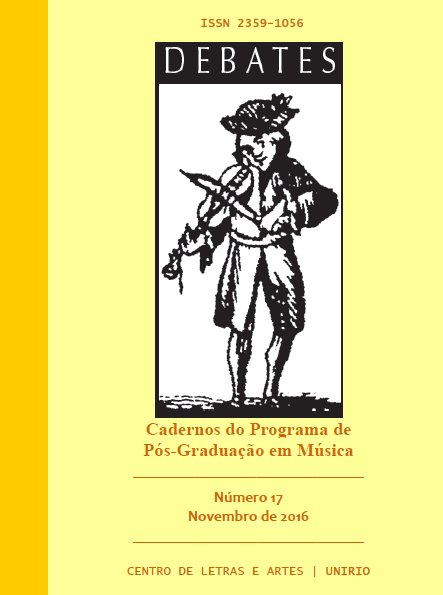Pensamento utópico de Koellreutter e sua matriz hegeliana: a construção de uma cultura planetária
Resumo
17
Resumo: Este trabalho é um desdobramento de um projeto de pesquisa em andamento acerca do pensamento estético de Koellreutter. Pretende-se demonstrar as afinidades entre as concepções do compositor e elementos contidos na filosofia de Hegel, sobretudo a concepção universalista de humanidade e a ideia de progresso, na qual a História aparece como processo racional e pré-determinado. Pode-se destacar ainda que o “Oriente” é visto pelo filósofo e pelo compositor como aurora da Humanidade, representando um nível inicial de desenvolvimento do Espírito (Geist), que se revela progressivamente através dos diferentes estágios de desenvolvimento até chegar a uma etapa final, que para o compositor já não é realizada pelo “mundo germânico”, tal como em Hegel, mas por uma sociedade tecnológica universal. Analisando a correspondência entre Koellreutter e Tanaka, bem como outras fontes elaboradas na Índia e no Japão nas décadas de 1960 e 1970, pretende-se discutir o projeto koellreuttiano de elaboração de uma cultura planetária universal, que realizaria uma síntese a partir da oposição entre um “Oriente”, valorizado por suas tradições musicais complexas, expressões de uma consciência intuitiva, e um “Ocidente”, caracterizado por seu racionalismo fragmentador, do qual teriam derivado uma estética naturalista e o sistema tonal. Para realizar tal crítica, utiliza-se alguns conceitos elaborados por Georgina Born (2000) e John Corbett (2000), que permitem aproximar as criações do compositor de outras realizações utópicas baseadas numa fantasia de transculturação híbrida que, de certo modo, dão continuidade ao orientalismo conceitual inaugurado por John Cage.
Palavras-chave: Koellreutter. Utopia. Globalização. Hegelianismo. Orientalismo.
The utopian thinking of Koellreutter and its Hegelian matrix: the construction of a planetary culture
Abstract: This paper is an unfolding of a research project in progress about the aesthetic thought of Koellreutter. It is intended to demonstrate the similarities between the composer's ideas and elements contained in the philosophy of Hegel, especially the universalist conception of humanity and the idea of progress, in which History appears as a rational and predetermined process. It can be noted that the “Orient” is seen by both the philosopher and the composer as the dawn of Humanity, representing an initial level of development of the Spirit (Geist) that reveals itself progressively through the different stages of development up to reach a final step, which would not be carried out by the “German world”, as in Hegel’s thought, but by a universal technological society. Analyzing the correspondence between Koellreutter and Tanaka and other sources produced in India and Japan during the sixties and seventies, we intend to discuss Koellreutter’s project of constructing an universal global culture, which would be a synthesis resulting from the opposition between an "Orient", valued for its complex musical traditions seen as expressions of an intuitive consciousness, and an "Occident", characterized by its fragmenting rationalism, from which would have derived a naturalistic aesthetic and the tonal system. Some concepts developed by Georgina Born (2000) e J. Corbett (2000) were used to make such discussion, as they allow us to put the composer’s works aside to other utopian achievements based on a fantasy of hybrid transculturation that, in a certain way, give continuity to a conceptual Orientalism started by John Cage.
Keywords: Koellreutter. Utopia. Globalization. Hegelianism. Orientalism.


